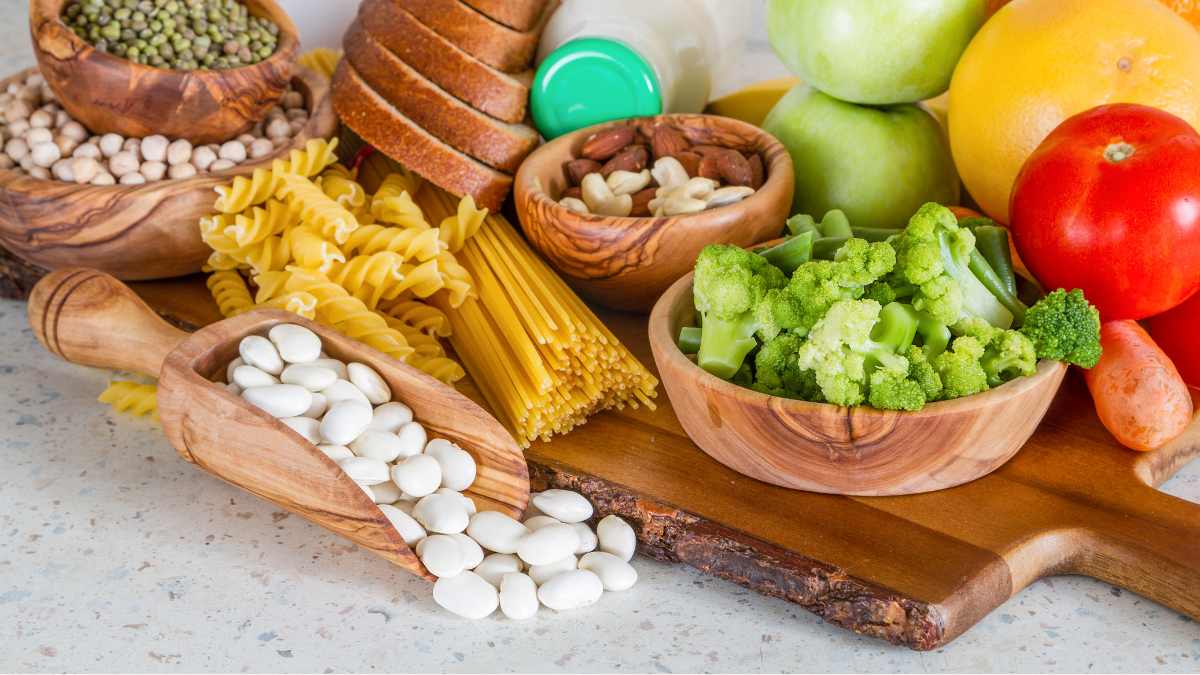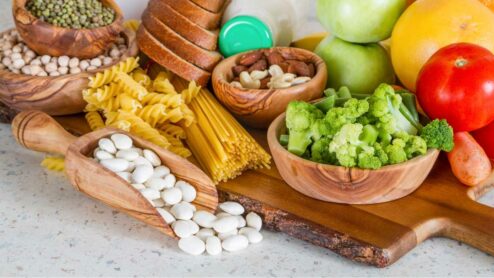Introduction: Vegetarianism is a dietary choice that has gained significant popularity globally, driven by health, ethical, and environmental concerns. However, there is often confusion about whether vegetarians consume dairy products. This article explores the variations and practices within vegetarianism, the types of vegetarian diets, the role of dairy consumption, nutritional implications, ethical considerations, and alternatives to dairy.
Defining Vegetarianism: Variations and Practices
Vegetarianism is broadly defined as a diet that excludes meat, poultry, and fish. However, within this broad definition, there are several variations and practices. Some vegetarians consume animal products like dairy and eggs, while others avoid all animal-derived products. Understanding these differences is crucial for a comprehensive view of vegetarianism.
The most common form of vegetarianism is lacto-ovo vegetarianism, where individuals consume dairy products and eggs but avoid meat, poultry, and fish. This practice is prevalent due to its balance of ethical considerations and nutritional intake. Lacto-vegetarians, on the other hand, consume dairy but avoid eggs along with meat, poultry, and fish.
Another variation is ovo-vegetarianism, where individuals consume eggs but avoid dairy products, meat, poultry, and fish. This form is less common but still significant within the vegetarian community. Finally, there are vegans who avoid all animal-derived products, including dairy, eggs, and even honey, adhering to a strictly plant-based diet.
Understanding these variations helps clarify the dietary choices and ethical considerations of different vegetarian groups. It also highlights the diversity within the vegetarian community, emphasizing that not all vegetarians follow the same dietary restrictions.
Types of Vegetarian Diets: A Comprehensive Overview
The types of vegetarian diets can be categorized based on the inclusion or exclusion of certain animal products. This categorization helps in understanding the dietary practices and nutritional intake of different vegetarian groups.
Lacto-ovo vegetarians consume both dairy products and eggs. This diet is often considered the most balanced in terms of nutritional intake, as it includes sources of protein, calcium, and other essential nutrients from dairy and eggs. It is also the most common form of vegetarianism in Western countries.
Lacto-vegetarians exclude eggs but include dairy products. This diet is prevalent in certain cultural and religious contexts, such as among some Hindu communities. The inclusion of dairy helps in meeting the nutritional needs that might otherwise be challenging in a plant-based diet.
Ovo-vegetarians include eggs but exclude dairy products. This diet is less common but is chosen by individuals who may have lactose intolerance or ethical concerns about the dairy industry. Eggs provide a good source of protein and other essential nutrients for ovo-vegetarians.
Vegans avoid all animal-derived products, including dairy and eggs. This diet is the most restrictive but is chosen by individuals who have strong ethical, environmental, or health reasons. Vegans rely on plant-based sources for their nutritional needs, which requires careful planning to ensure a balanced diet.
Dairy Consumption Among Different Vegetarian Groups
Dairy consumption varies significantly among different vegetarian groups. Lacto-ovo vegetarians and lacto-vegetarians include dairy in their diets, while ovo-vegetarians and vegans do not. Understanding these differences is essential for addressing the nutritional and ethical considerations of each group.
For lacto-ovo vegetarians, dairy products are a significant source of calcium, vitamin D, and protein. These nutrients are crucial for bone health and overall well-being. Dairy products like milk, cheese, and yogurt are commonly included in their diet, providing a variety of flavors and textures.
Lacto-vegetarians also consume dairy products, relying on them for essential nutrients. The exclusion of eggs means that dairy becomes an even more critical source of protein and other nutrients. This group often includes a wide range of dairy products in their diet to ensure nutritional balance.
Ovo-vegetarians do not consume dairy products, which means they need to find alternative sources of calcium and vitamin D. Eggs provide a good source of protein, but ovo-vegetarians must be mindful of their overall nutrient intake to avoid deficiencies.
Vegans avoid all dairy products, relying entirely on plant-based sources for their nutritional needs. This requires careful planning to ensure adequate intake of calcium, vitamin D, and protein. Fortified plant-based milk alternatives, leafy greens, and legumes are commonly used to meet these nutritional requirements.
Nutritional Implications of Dairy in Vegetarian Diets
The inclusion of dairy in vegetarian diets has significant nutritional implications. Dairy products are rich in essential nutrients like calcium, vitamin D, and protein, which are crucial for maintaining overall health, particularly bone health.
For lacto-ovo vegetarians and lacto-vegetarians, dairy products provide a convenient and effective way to meet their nutritional needs. Calcium and vitamin D from dairy are essential for bone density and preventing osteoporosis. Protein from dairy products also supports muscle maintenance and repair.
Ovo-vegetarians and vegans need to find alternative sources for these nutrients. Ovo-vegetarians can rely on eggs for protein but must seek other sources for calcium and vitamin D, such as fortified plant-based milks and leafy greens. Vegans, in particular, need to be diligent in their dietary planning to ensure they get enough of these nutrients from plant-based sources.
The exclusion of dairy in vegan diets requires careful attention to nutrient intake. Fortified plant-based milks, such as almond, soy, or oat milk, can provide calcium and vitamin D. Additionally, consuming a variety of plant-based proteins, such as beans, lentils, and tofu, helps meet protein needs.
Overall, the nutritional implications of dairy consumption in vegetarian diets highlight the importance of balanced and well-planned meals to ensure adequate intake of essential nutrients.
Ethical Considerations: Dairy Production and Vegetarians
The ethical considerations surrounding dairy production are a significant factor for many vegetarians when deciding whether to include dairy in their diet. Animal welfare and environmental impact are primary concerns.
For some vegetarians, the treatment of dairy cows and the conditions in which they are kept are major ethical issues. Factory farming practices, where cows are often kept in confined spaces and subjected to unnatural living conditions, raise concerns about animal cruelty. This leads some vegetarians to avoid dairy products altogether.
Environmental impact is another critical consideration. Dairy production contributes to greenhouse gas emissions, water usage, and land degradation. Vegetarians who are concerned about the environmental footprint of their diet may choose to reduce or eliminate dairy consumption to align with their values.
Ethical vegetarians may seek out ethical dairy sources, such as products from farms that prioritize animal welfare and sustainable practices. These products may be more expensive but offer a compromise for those who wish to include dairy in their diet while minimizing ethical concerns.
Ultimately, the decision to consume dairy is a personal one, influenced by individual values and beliefs. Understanding the ethical implications of dairy production helps vegetarians make informed choices that align with their principles.
Alternatives to Dairy for Vegetarian Diets
For vegetarians who choose to avoid dairy, there are numerous alternatives available that can provide similar nutritional benefits. Plant-based milks, cheeses, and yogurts are widely available and can be incorporated into a vegetarian diet.
Plant-based milks such as almond, soy, oat, and rice milk are popular alternatives to cow’s milk. These milks are often fortified with calcium and vitamin D to match the nutritional profile of dairy milk. They can be used in cooking, baking, and as a beverage.
Plant-based cheeses made from nuts, soy, or coconut oil offer a dairy-free alternative for those who miss the taste and texture of cheese. These products have improved significantly in taste and quality, making them a viable option for vegetarians.
Plant-based yogurts are another alternative, made from almond, soy, or coconut milk. These yogurts are often fortified with probiotics and other nutrients, providing similar health benefits to dairy yogurt. They can be enjoyed on their own or used in recipes.
In addition to these products, vegetarians can also rely on whole foods such as nuts, seeds, leafy greens, and legumes to meet their nutritional needs. These foods are rich in calcium, protein, and other essential nutrients, making them excellent alternatives to dairy.
Conclusion: The question of whether vegetarians eat dairy food depends on the type of vegetarian diet they follow. While lacto-ovo vegetarians and lacto-vegetarians include dairy in their diets, ovo-vegetarians and vegans do not. Understanding the variations within vegetarianism, the nutritional implications of dairy, and the ethical considerations surrounding dairy production helps vegetarians make informed dietary choices. For those who choose to avoid dairy, numerous plant-based alternatives are available to ensure a balanced and nutritious diet.
More informations:
- Vegetarian Society: Provides detailed information on the different types of vegetarian diets and their definitions.
- Harvard T.H. Chan School of Public Health: Offers insights into the nutritional aspects of vegetarian diets, including the role of dairy.
- American Dietetic Association: Discusses the health benefits and nutritional considerations of vegetarian diets.
- PETA: Explores the ethical concerns related to dairy production and animal welfare.
- Mayo Clinic: Provides practical advice on following a vegetarian diet and alternatives to dairy products.


